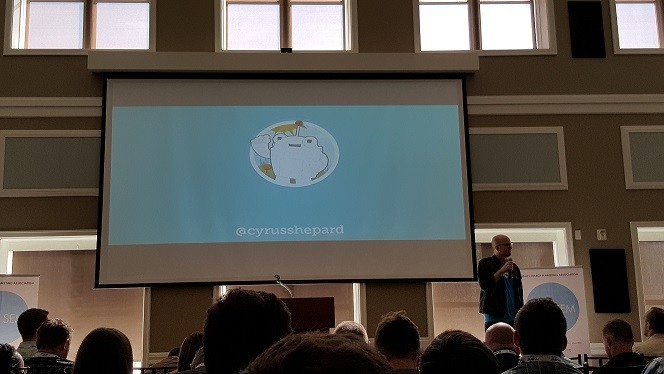
SLC|SEM has been a big part of the digital marketing community in Utah for the last four years or so, and yesterday they hosted the Digital Marketing Conference for 2015, bringing in some industry leaders and insiders for a day of education and networking. We kicked off the conference with Cyrus Shepard, Head of Audience Development at Moz.
Cyrus started with a story of his first marketing job: telemarketing. An experience he despised, and one that made SEO seem so liberating because now it was about giving people exactly what they want, when they want it. It wasn’t about cold calling and trying to convince someone that they really wanted a particular item.
But what has happened to SEO over the years?
He started to talk about where it has gone, and what it’s like to work at Moz, and how this has led to the myth of “advanced SEO.”
Everyone, he said, thinks Moz has all the answers and that they’ve got some kind of advantage over everyone else. But everything they know they put on their blog, so it’s there for everyone who wants to “do SEO” to a page.
And that, he said, is how people perceive advanced SEO. It involves:
Those definitely seem like some technical words, and if we want to “SEO that page” it will involve them all one way or another. And if you do it right, this so-called advanced SEO will probably get you to page one. It all works, and it’s all relevant. However, there’s a big difference between page 1 and the top spot of page 1, and SEOing a page is less and less likely to get you to that highly coveted spot.
Why? Because we’re not asking what the User wants. We’re only focusing on what we want (i.e. to rank well for a given keyword).
There has always been two basic optimization strategies: optimizing for search engines, and optimizing for users. Google has always said we should optimize for users, but we know that optimizing for search engines works.
But does it work as well as it could? Or as well as it did?
Cyrus claimed that the USER is now a Ranking Signal. And it’s a big one. In fact, they did a survey to determine what people in the industry believe would become important ranking signals, and 3 out of 4 of them were user-based features.
So Cyrus provided 7 Tips for Human Optimized SEO
1. The User Chooses You
This is about improving clickthrough rate by modifying search result rankings based on user feedback. Google has done some testing with this, but hasn’t been specific on it. Moz, however, did some of their own tests and they did see some changes when users actually clicked on a page and stayed there for a while. (Be warned that penalties are ready and waiting for people who try to manipulate results this way.)
2. Task Completion
This was mostly about the bounce rate, but he referred to it as “Pogo Sticking” between different results. When someone is searching for something, there is a task they want to complete. His example was the case of “good mesothelioma lawyer Chicago.” That may be the keyword you want to rank for, but they’re probably just looking to “Hire a lawyer.” To help with task completion you should:
3. Answer Questions that Users Haven’t Asked Yet
Users ask all kinds of questions, and they’re going to ask follow up questions, too. Start by addressing the things you want to rank for, what you know people are already asking for, but then include things that people haven’t realized they wanted to ask yet.
4. Supplemental Content
Google talks about supplemental content all the time, but most marketers don’t. He points to Google’s quality rating guidelines which state that this kind of content can be a large part of what makes a high quality page very satisfying for its purpose. Features designed to help users find other products and content they might also like can be as effective as the main content on the page.
5. Human Formatting
80% of people never read all your stuff. They’re too impatient to find their answers.
6. Buy eyeballs (not links)
7. Homework
Just to help us get something actionable out of it, he gave us this this to-do list.
In the end, he reiterated that it feels good to not be the telemarketer guy and trying to force unwanted products on unknown people. Now, more than ever, SEO is about optimizing for the user, so he gets to feel like he’s always giving people exactly what they want, when they want it.
